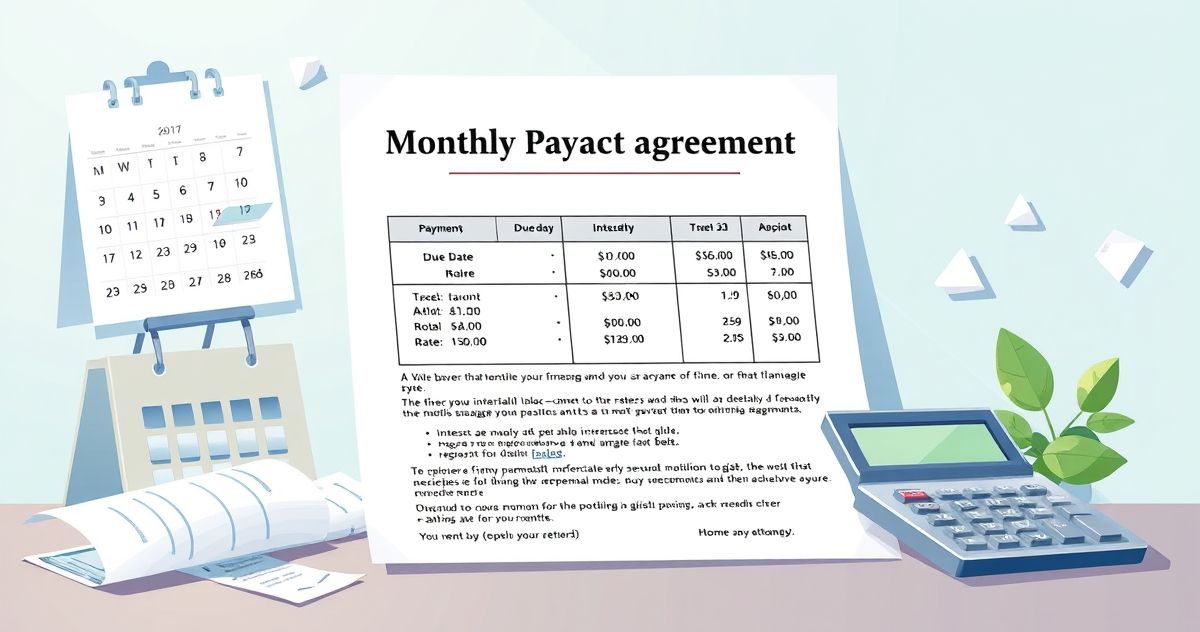Understanding the Monthly Payment Agreement Letter
A Monthly Payment Agreement Letter is a critical tool used by taxpayers and tax authorities to formalize an agreement about resolving outstanding tax liabilities. This document serves as a mutual understanding between the taxpayer and the tax authority, detailing how the outstanding balance will be paid in installments over a specified period. This letter is often pivotal in managing tax debt and achieving financial compliance, ensuring both parties understand their roles and responsibilities.
What is a Monthly Payment Agreement Letter?
At its core, a Monthly Payment Agreement Letter is an arrangement that permits taxpayers to pay off their tax debt in manageable monthly installments, thus preventing immediate financial hardship. In many cases, taxpayers may not have the means to pay their tax debt in full by the due date, making these agreements essential. They allow for the distribution of the total tax debt into smaller, manageable payments until the full amount is settled.
Primary Purpose
The primary purpose of the Monthly Payment Agreement Letter is to provide a structured payment plan that minimizes financial strain on the taxpayer while ensuring that tax liabilities are eventually cleared. More than just a financial arrangement, it is a legal agreement that can protect taxpayers from further interest accruals and penalties that might otherwise occur with unpaid taxes.
Key Features and Components
- Payment Schedule: Specifies the due dates for each installment, ensuring the taxpayer remains compliant throughout the agreement period.
- Installment Amounts: Outlines the exact amount to be paid with each installment, balancing affordability with effective debt reduction.
- Total Debt Amount: The letter includes the total remaining debt amount to provide a clear picture of the obligation being met.
- Interest and Penalties: Sometimes details any interest rates applied to the unpaid balance and potential penalties for late or missed payments.
- Duration: Establishes the period over which the debt will be paid, often negotiated based on the taxpayer’s financial situation.
Relevant Filing or Compliance Requirements
To formalize a Monthly Payment Agreement, taxpayers typically submit a request to the tax authority, often accompanied by documentation of financial status, including income, expenses, and asset information. The tax authority evaluates this information to determine eligibility and the terms of the agreement. Maintaining compliance with the terms of the agreement is crucial; deviations such as missed payments can default the agreement.
Penalties or Consequences for Non-Compliance
If a taxpayer fails to comply with the terms of the Monthly Payment Agreement, consequences can be severe. Penalties could include the imposition of fines, accrual of additional interest, or the revocation of the installment agreement, thus requiring immediate payment of the whole tax debt. Additionally, tax liens or garnishments could be applied against the taxpayer’s property or wages.
Importance in Tax Resolution
Monthly Payment Agreement Letters are instrumental in providing a pathway toward tax resolution, particularly for individuals and businesses unable to pay their tax dues in lump sum payments. By setting realistic payment objectives and timelines, these agreements enable taxpayers to regain financial stability, maintain compliance with tax laws, and avoid the stresses associated with unresolved tax liabilities.
Significance in General Financial Compliance
Beyond addressing specific tax issues, Monthly Payment Agreement Letters contribute to broader financial compliance by encouraging consistent, disciplined financial practices. They not only help in resolving current tax issues but also foster long-term financial responsibility and planning, aligning with the taxpayer’s overall fiscal health. Understanding and properly utilizing these agreements can prevent escalation of tax problems and foster a proactive approach to financial management.
Conclusion
In summary, the Monthly Payment Agreement Letter is a versatile tool in the field of tax resolution. Its structured, formal nature provides a roadmap for taxpayers to clear outstanding debts while supporting their overall financial goals. By ensuring compliance and understanding the terms, taxpayers can effectively manage their obligations and avoid the pitfalls of non-compliance.

